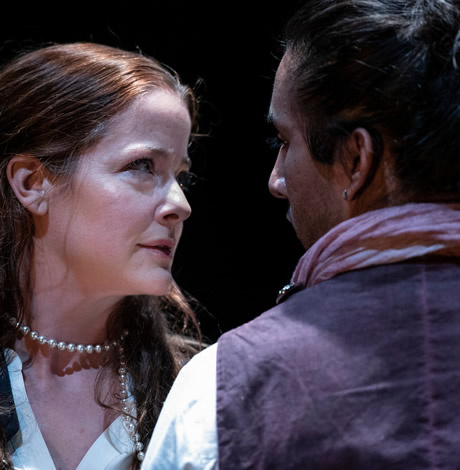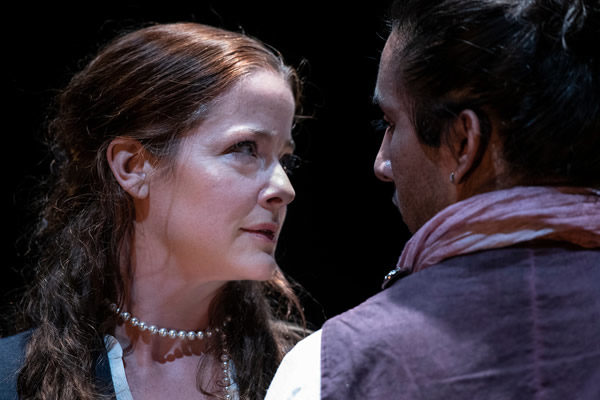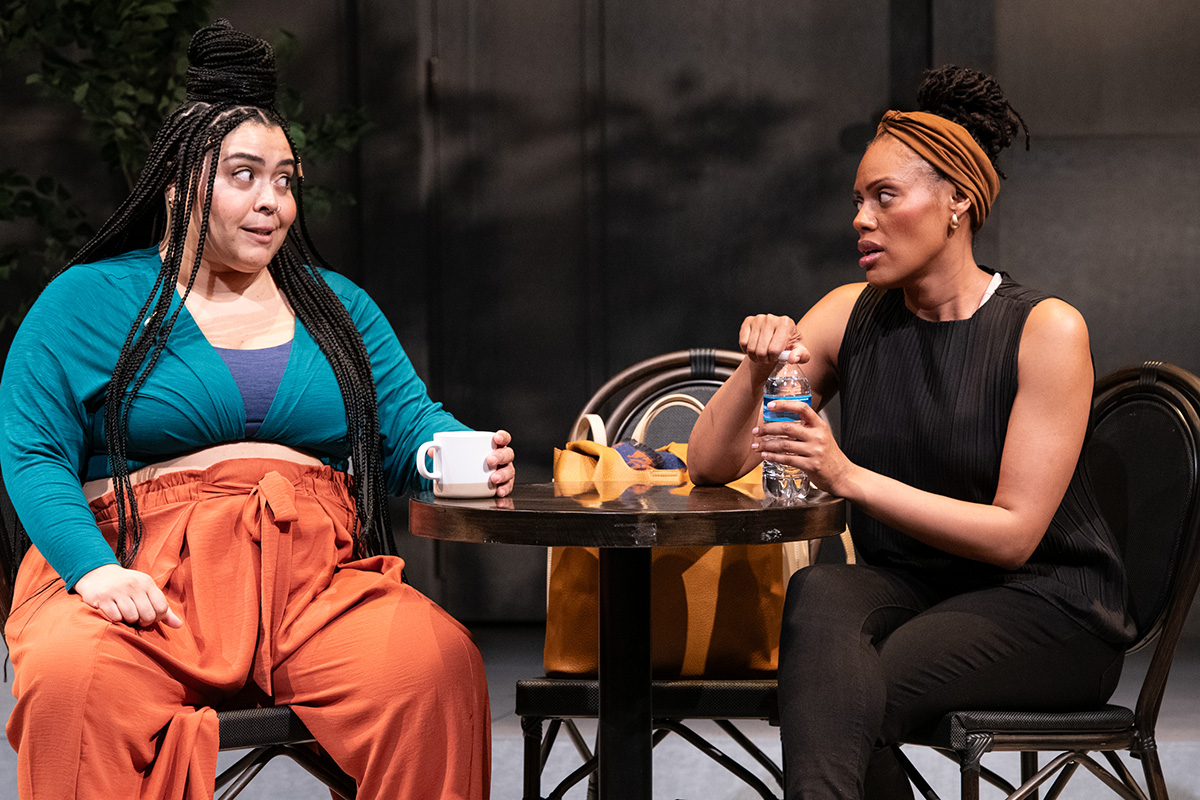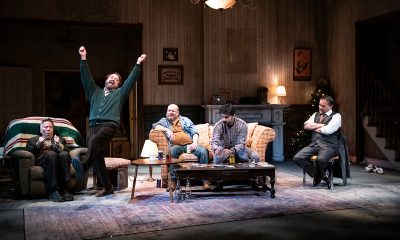Theater
German classic play ‘Mary Stuart’ compelling in fresh Olney production
A tale of two queens excels with clever staging, solid cast


‘Mary Stuart’
Through June 9
Olney Theatre Center
2001 Olney Sandy Spring Rd, Olney, Md.
Tickets begin at $54
301-924-3400
A battle of wills, words and intrigue, the decades-long feud between Queen Elizabeth I and her ill-fated cousin Mary Stuart ranks among English history’s most gripping power struggles. Their story couldn’t be more suited to dramatization, and in his classic “Mary Stuart” (1800), German playwright Friedrich Schiller toys with details but doesn’t stray far from the facts.
Now Schiller’s tale of two queens is being told at Olney Theatre Center with a fresh and suspenseful adaptation by Olney’s out artistic director Jason Loewith. By paring down language, cast and setting, Loewith (who also staged the production) achieves a superb amalgam of classic and current.
Once queen of Scotland (and briefly France), Mary now languishes in dank, cramped quarters as “the guest” of her powerful cousin, the Queen of England. Mary, played by Eleasha Gamble with a mix of decorum and lively impetuosity, accepts her current situation with regal aplomb while harboring hope for a second shot at the big time.
A legitimate claimant to the English throne with a sizeable Catholic following, Mary is a threat that England’s highest Protestant jury has voted to neutralize. Wary of regicide, Elizabeth remains decisively ambivalent. Megan Anderson’s Elizabeth is outwardly confident — tailored pants, commanding, a woman in a man’s world, etc. — but beneath the façade she’s not entirely secure. There’s also a lusty side, particularly when handsome younger men are around.
Olney’s intimate Mulitz-Gudelsky black box space has been configured in the round. Set designer Richard Oulette and Loewith’s beautifully simple set is a shiny black octagon with a sort of crown echoing the stage’s shape hanging high above. It’s well suited to claustrophobic rooms, Elizabeth’s offices and a grassy field.
And the strong, six-person cast, dressed casually in muted tones like casually dressed college faculty members during fall semester (costume designer Ivania Stack cleverly adds an Elizabethan ruff, medal, crucifix or string of pearls to designate rank and station), play multiple roles. In addition to Elizabeth, Anderson lovingly assays Hannah Kennedy, Mary’s elderly companion. Gamble also plays the roles of various noblemen.
Talented actor Chris Genebach brings to life two pivotal, vastly different men: Sir Amyas Paulet, the harsh but principled jailor who won’t engage in shady moves to hasten the prisoner’s demise, as well as the Earl of Leicester, a strapping courtier who uses lovemaking to advance his agenda. Genebach is equally effective in both parts.
Olney vets Paul Morella and Mitchell Hébert are perfectly cast as Elizabeth’s advisors Lord Burleigh and Shrewsbury, respectively. Burleigh is itching to behead Mary and excise “popery” from the English isle; whereas, the elder Burleigh advises mercy.
Jake Ryan Lozano excels as Mortimer, Sir Palet’s young nephew who has access to Mary. Recently returned from the continent where he embraced Catholicism and fashion (a flowy, rose-colored scarf) he pledges his allegiance to Mary, confiding that’s he’s raised a posse to liberate her at long last. His dreams are inspired. Unfortunately, he proves quite mad.
Though Mary and Elizabeth never met in history, Schiller couldn’t resist bringing them together. Released from her rooms for a day, Mary runs barefoot in the grass relishing a tease of freedom. When Elizabeth arrives unexpectedly on the scene, Mary feigns humility. Elizabeth doesn’t buy it. She insists that her cousin queen lie prostate before her. In a genius bit of staging, both queens lie prostate, their faces close, and as the stage slowly begins to rotate, their feelings are revealed.
After the meeting, Mary’s end is decided. Cagey as ever, Elizabeth wants to be rid of her rival, but doesn’t want the blame. She places the blame on a royal secretary.
This “Mary Stuart” trains the spotlight on power and patriarchy. And while Mary, the ostensible loser, meets her fate with royal dignity, Elizabeth’s glorious and onerous reign grinds on.
Theater
Round House explores serious issues related to privilege
‘A Jumping-Off Point’ is absorbing, timely, and funny

‘A Jumping-Off Point’
Through May 5
Round House Theatre
4545 East-West Highway, Bethesda, Md.
$46-$83
Roundhousetheatre.org
In Inda Craig-Galván’s new play “A Jumping-Off Point,” protagonist Leslie Wallace, a rising Black dramatist, believes strongly in writing about what you know. Clearly, Craig-Galván, a real-life successful Black playwright and television writer, adheres to the same maxim. Whether further details from the play are drawn from her life, is up for speculation.
Absorbing, timely, and often funny, the current Round House Theatre offering explores some serious issues surrounding privilege and who gets to write about what. Nimbly staged and acted by a pitch perfect cast, the play moves swiftly across what feels like familiar territory without being the least bit predictable.
After a tense wait, Leslie (Nikkole Salter) learns she’s been hired to be showrunner and head writer for a new HBO MAX prestige series. What ought to be a heady time for the ambitious young woman quickly goes sour when a white man bearing accusations shows up at her door.
The uninvited visitor is Andrew (Danny Gavigan), a fellow student from Leslie’s graduate playwriting program. The pair were never friends. In fact, he pressed all of her buttons without even trying. She views him as a lazy, advantaged guy destined to fail up, and finds his choosing to dramatize the African American Mississippi Delta experience especially annoying.
Since grad school, Leslie has had a play successfully produced in New York and now she’s on the cusp of making it big in Los Angeles while Andrew is bagging groceries at Ralph’s. (In fact, we’ll discover that he’s a held a series of wide-ranging temporary jobs, picking up a lot of information from each, a habit that will serve him later on, but I digress.)
Their conversation is awkward as Andrew’s demeanor shifts back and forth from stiltedly polite to borderline threatening. Eventually, he makes his point: Andrew claims that Leslie’s current success is entirely built on her having plagiarized his script.
This increasingly uncomfortable set-to is interrupted by Leslie’s wisecracking best friend and roommate Miriam who has a knack for making things worse before making them better. Deliciously played by Cristina Pitter (whose program bio describes them as “a queer multi-spirit Afro-indigenous artist, abolitionist, and alchemist”), Miriam is the perfect third character in Craig-Galván’s deftly balanced three-hander.
Cast members’ performances are layered. Salter’s Leslie is all charm, practicality, and controlled ambition, and Gavigan’s Andrew is an organic amalgam of vulnerable, goofy, and menacing. He’s terrific.
The 90-minute dramedy isn’t without some improbable narrative turns, but fortunately they lead to some interesting places where provoking questions are representation, entitlement, what constitutes plagiarism, etc. It’s all discussion-worthy topics, here pleasingly tempered with humor.
New York-based director Jade King Carroll skillfully helms the production. Scenes transition smoothly in large part due to a top-notch design team. Scenic designer Meghan Raham’s revolving set seamlessly goes from Leslie’s attractive apartment to smart cafes to an HBO writers’ room with the requisite long table and essential white board. Adding to the graceful storytelling are sound and lighting design by Michael Keck and Amith Chandrashaker, respectively.
The passage of time and circumstances are perceptively reflected in costume designer Moyenda Kulemeka’s sartorial choices: heels rise higher, baseball caps are doffed and jackets donned.
“A Jumping-Off Point” is the centerpiece of the third National Capital New Play Festival, an annual event celebrating new work by some of the country’s leading playwrights and newer voices.
Theater
‘Amm(i)gone’ explores family, queerness, and faith
A ‘fully autobiographical’ work from out artist Adil Mansoor

‘Amm(i)gone’
Thorough May 12
Woolly Mammoth Theatre
641 D St., N.W.
$60-$70
Woollymammoth.net
“Fully and utterly autobiographical.” That’s how Adil Mansoor describes “Amm(i)gone,” his one-man work currently playing at Woolly Mammoth Theatre.
Both created and performed by out artist Mansoor, it’s his story about inviting his Pakistani mother to translate Sophocles’s Greek tragedy “Antigone” into Urdu. Throughout the journey, there’s an exploration of family, queerness, and faith,as well as references to teachings from the Quran, and audio conversations with his Muslim mother.
Mansoor, 38, grew up in the suburbs of Chicago and is now based in Pittsburgh where he’s a busy theater maker. He’s also the founding member of Pittsburgh’s Hatch Arts Collective and the former artistic director of Dreams of Hope, an LGBTQ youth arts organization.
WASHINGTON BLADE: What spurred you to create “Amm(i)gone”?
ADIL MANSOOR: I was reading a translation of “Antigone” a few years back and found myself emotionally overwhelmed. A Theban princess buries her brother knowing it will cost her, her own life. It’s about a person for whom all aspirations are in the afterlife. And what does that do to the living when all of your hopes and dreams have to be reserved for the afterlife?
I found grant funding to pay my mom to do the translation. I wanted to engage in learning. I wanted to share theater but especially this ancient tragedy. My mother appreciated the characters were struggling between loving one another and their beliefs.
BLADE: Are you more director than actor?
MANSOOR: I’m primarily a director with an MFA in directing from Carnegie Mellon. I wrote, directed, and performed in this show, and had been working on it for four years. I’ve done different versions including Zoom. Woolly’s is a new production with the same team who’ve been involved since the beginning.
I love solo performance. I’ve produced and now teach solo performance and believe in its power. And I definitely lean toward “performance” and I haven’t “acted” since I was in college. I feel good on stage. I was a tour guide and do a lot of public speaking. I enjoy the attention.
BLADE: Describe your mom.
MANSOOR: My mom is a wonderfully devout Muslim, single mother, social worker who discovered my queerness on Google. And she prays for me.
She and I are similar, the way we look at things, the way we laugh. But different too. And those are among the questions I ask in this show. Our relationship is both beautiful and complicated.
BLADE: So, you weren’t exactly hiding your sexuality?
MANSOOR: In my mid-20s, I took time to talk with friends about our being queer with relation to our careers. My sexuality is essential to the work. As the artistic director at Dreams of Hope, part of the work was to model what it means to be public. If I’m in a room with queer and trans teenagers, part of what I’m doing is modeling queer adulthood. The way they see me in the world is part of what I’m putting out there. And I want that to be expansive and full.
So much of my work involves fundraising and being a face in schools. Being out is about making safe space for queer young folks.
BLADE: Have you encountered much Islamophobia?
MANSOOR: When 9/11 happened, I was a sophomore in high school, so yes. I faced a lot then and now. I’ve been egged on the street in the last four months. I see it in the classroom. It shows up in all sorts of ways.
BLADE: What prompted you to lead your creative life in Pittsburgh?
MANSOOR: I’ve been here for 14 years. I breathe with ease in Pittsburgh. The hills and the valleys and the rust of the city do something to me. It’s beautiful, it’ affordable, and there is support for local artists. There’s a lot of opportunity.
Still, the plan was to move to New York in September of 2020 but that was cancelled. Then the pandemic showed me that I could live in Pittsburgh and still have a nationally viable career.
BLADE: What are you trying to achieve with “Amm(i)gone”?
MANSOOR: What I’m sharing in the show is so very specific but I hear people from other backgrounds say I totally see my mom in that. My partner is Catholic and we share so much in relation to this.
I hope the work is embracing the fullness of queerness and how means so many things. And I hope the show makes audiences want to call their parents or squeeze their partners.
Theater
Jessica Phillips shines in ‘Penelope,’ a ‘pandemic parable’
Alex Bechtel was inspired to write about loneliness, waiting, separation

‘Penelope’
Thorough April 28
Signature Theatre, the Ark
4200 Campbell Ave, Arlington
$40-$99
Sigtheatre.org
In the new musical “Penelope,” Broadway’s Jessica Phillips gives an unforgettable take on the title role torn from the pages of Homer’s “Odyssey” — more or less. Fortified by bourbon and backed by a Greek chorus of musicians, the character uncharacteristically steps out from the background to share her story surrounding two decades waiting on the island kingdom of Ithica for the return of her absent husband Odysseus.
Sometimes described as a “pandemic parable,” the 70-minute work is based on composer/playwright Alex Bechtel’s personal experience. While separated from his partner during COVID, he was inspired to write about loneliness, waiting, and separation, a subject Phillips was eager to tackle.
An accomplished Broadway actor and mother of two, Phillips, 52, is best known for memorable turns in “Dear Evan Hansen,” “The Scarlet Pimpernel,” “Next to Normal,” and “Priscilla Queen of the Desert.”
Two years ago, she made news for coming out as queer after having long been identified as straight. Parts of the theater scene were caught a bit off guard, but only momentarily. Now, she lives in New York with her partner Chelsea Nachman, a theatrical publicist.“We share the same professional community but in very different roles. I think that makes life easier for us.”
Currently enjoying an extended run at Signature in Arlington where the trees are in bloom, she spares time for a phone interview, starting off with“Perfect timing. I’ve just finished the last song on Beyonce’s ‘Cowboy Carter.’ Let’s talk.”
WASHINGTON BLADE: Increasingly, I hear artists report having been deeply changed by the pandemic. Did that have anything to do with your coming out in 2022?
PHILLIPS: Definitely. During the pandemic, those of us in the arts were in deep crisis, because our industry had collapsed in almost every way. At the same time, that space allowed us to be contemplative about where we were. For me, that period of time gave me the space to both come to terms with and confront those fears about saying who I was, out loud and publicly.
BLADE: Did you have professional concerns?
PHILLIPS: Oh yeah, I was specifically worried about perception. Not so much about being queer but more what it meant to have come out relatively late in life. I had some fear around whether people would take me less seriously.
At the same time, I was nervous about being fully transparent and worried about my privacy and being vulnerable. Like other women I knew, I was more comfortable dealing with traditional societal expectations in America. I grew up with those cultural expectations and thought of myself in those terms for a long time.
BLADE: What changed?
PHILLIPS: What’s been so freeing for me, I can confront how I took on those expectations and say I’m not going to let those determine how I live my life. I get to decide.
BLADE: There’s a lot of wonderful storytelling in “Penelope.” What’s been your way into that?
PHILLIPS: My way of moving through the show is allowing this character to experience all five stages of grief. Humor, slapstick comedy, bargaining, denial. And ultimately acceptance and deep grief.
When an audience is alive and invested, it’s palpable and elevates the storytelling. When an audience is having a thinking rather feeling experience that changes the tone of my storytelling and not in a bad way.
It’s interesting how much they’re a part of everything. It’s really intimate. The audience is just six feet away. It’s a unique experience and we’re on this ride together. And I find this to be a really beautiful and satisfying experience that I’ve not had before.
BLADE: After Signature, what’s next for “Penelope”?
PHILLIPS: That’s the million-dollar question. Hopefully we’ll take it forward to New York or tour it, but that requires willingness and money. I do think there’s a broad audience for this. It’s beautiful, unique, artistic, really emotional, and at the same time possesses an intellectual quality that’s missing from a lot of commercial theater these days.
BLADE: And what’s next for theater?
Phillips: I think one good thing that came out of the pandemic is that people like Alex Bechtel had an opportunity to create. In the next decade we’re going to see the results of that. I think we have some extraordinary things to look forward to. If a work like “Penelope” is any indication, we’re all in for something really good.
-

 State Department5 days ago
State Department5 days agoState Department releases annual human rights report
-

 District of Columbia3 days ago
District of Columbia3 days agoCatching up with the asexuals and aromantics of D.C.
-

 South America3 days ago
South America3 days agoArgentina government dismisses transgender public sector employees
-

 Maine4 days ago
Maine4 days agoMaine governor signs transgender, abortion sanctuary bill into law












